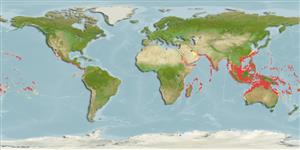Common names from other countries
Elasmobranchii (tubarões e raias) (sharks and rays) >
Carcharhiniformes (Ground sharks) >
Carcharhinidae (Requiem sharks)
Etymology: Triaenodon: triaeno, from triaina (Gr.), trident (having three points); odon (Gr.), tooth, referring to each having a cusp and two cusplets. (See ETYFish); obesus: Latin for fat or stout, referring to its blunt head, said to give the shark a plump appearance. (See ETYFish).
More on author: Rüppell.
Environment: milieu / climate zone / depth range / distribution range
Ecologia
marinhas associadas(os) a recifes; intervalo de profundidade 0 - 330 m (Ref. 244), usually 8 - 40 m (Ref. 244). Tropical; 29°N - 30°S, 33°E - 77°W (Ref. 55196)
Indo-Pacific: Red Sea and East Africa to Indonesia and the Arafura Sea (Ref. 9819), north to Ryukyu and Ogasawara islands, south to New South Wales (Australia), New Caledonia, and the Austral and Pitcairn islands; throughout Micronesia. Eastern Pacific: Cocos and Galapagos islands, Panama to Costa Rica.
Length at first maturity / Tamanho / Peso / Idade
Maturity: Lm 107.0, range 105 - 109 cm
Max length : 213 cm TL macho/indeterminado; (Ref. 244); common length : 160 cm TL macho/indeterminado; (Ref. 244); peso máx. Publicado: 18.3 kg (Ref. 4699); Idade máx. registada: 25 anos (Ref. 6807)
Espinhos dorsais (total) : 0; Espinhos anais: 0. A small, slender shark with an extremely short, broad snout, oval eyes, and conspicuous white tips on the 1st dorsal (sometimes 2nd) and upper caudal fins; 2nd dorsal almost as large as 1st; no interdorsal ridge (Ref. 5578). Spiracles usually present, teeth 47-50/ 44-46, in at least 2 functional rows. Grey above, lighter below and sometimes with dark spots on sides (Ref. 5578). First dorsal-fin lobe and dorsal caudal-fin lobe with conspicuous white tips, second dorsal-fin lobe and ventral caudal-fin lobe often white-tipped (Ref. 9997).
Sluggish inhabitant of lagoons and seaward reefs where it is often found resting in caves or under coral ledges during the day (Ref. 6871, 58302), or usually on a sand patch, or in a channel (Ref. 37816). More active at night or during slack tide in areas of strong currents (Ref. 37816). Feeds on benthic animals such as fishes, octopi, spiny lobsters and crabs (Ref. 244). Viviparous (Ref. 50449). Travels distances from about 0.3 to 3 km in periods up to about 1 year (Ref. 244). Rarely reported to attack humans, but is potentially dangerous especially when fish had been speared (Ref. 244). Probably fished wherever it occurs (Ref. 244). Caught by inshore longline and gillnet fisheries, and probably adversely affected by dynamite fishing (Ref.58048). Meat and liver utilized fresh for human consumption (Ref. 244). The liver of this shark has been reported as toxic (Ref. 583). One to five 60 cm young per litter (Ref. 1602). Minimum depth reported taken from Ref. 128797.
Viviparous, placental (Ref. 50449), with 1 to 5 young per litter (Ref. 244); usually 2 or 3 pups after a gestation period of > 5 months (Ref.58048). Size at birth 52-60 cm TL (Ref. 9997). Distinct pairing with embrace (Ref. 205).
During courtship and prior to copulation, the male bites the female on her right pectoral fin and uses his medially flexed right clasper in copulation (Ref. 49562, 51119). During copulation which lasts from 15 seconds to 4 minutes (Ref. 49562, 51119), both heads of the male and female are slammed in the substrate and their bodies undulate to keep their tails elevated (Ref. 51155). This mating behavior was observed in individuals bred in captivity.
Compagno, L.J.V., 1984. FAO Species Catalogue. Vol. 4. Sharks of the world. An annotated and illustrated catalogue of shark species known to date. Part 2 - Carcharhiniformes. FAO Fish. Synop. 125(4/2):251-655. Rome: FAO. (Ref. 244)
Categoria na Lista Vermelha da IUCN (Ref. 130435)
Ameaça para o homem
Traumatogenic (Ref. 4690)
Utilização humana
Pescarias: pouco comercial; peixe desportivo: sim
Ferramentas
Relatórios especiais
Descarregue XML
Fontes da internet
Estimates based on models
Preferred temperature (Ref.
115969): 24.3 - 28.8, mean 27.6 (based on 898 cells).
Phylogenetic diversity index (Ref.
82804): PD
50 = 1.0000 [Uniqueness, from 0.5 = low to 2.0 = high].
Bayesian length-weight: a=0.00339 (0.00200 - 0.00575), b=3.13 (2.99 - 3.27), in cm Total Length, based on LWR estimates for this species & (Sub)family-body (Ref.
93245).
Nível Trófico (Ref.
69278): 4.2 ±0.6 se; based on diet studies.
Resiliência (Ref.
120179): Muito baixo, tempo mínimo de duplicação da população maior que 14 anos (tm=5-9; tmax=25; Fec=1).
Fishing Vulnerability (Ref.
59153): Very high vulnerability (90 of 100).
